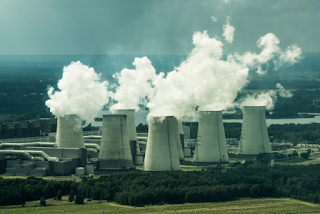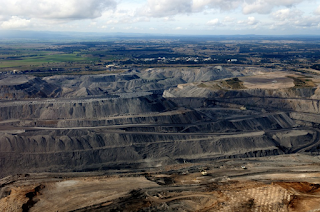Almost all governments, business, media and both the political ‘left’ and ‘right’ are busy extolling endless growth on a planet which is finite. Clearly endless economic growth is impossible, and its pursuit unsustainable and unethical and such destructive pursuit of the impossible is insane. Humanity is totally dependent on the biosphere and it is degrading. Hence society needs to realize that we are way past sustainable ecological limits.
Four Earths would be needed if everyone lived like Americans.
Growth mantra has simply made rich much richer while poor remained poor. The disparity between rich and poor has widened like never before. This trend can't go on forever. In order to retain our humanity in the face of ecological limits, we would have to confront inequality head on. If wealth were divided equally among the all the people in the world, the per capita material affluence would drop significantly. Global society has already entered the phase where the capacity to grow, to generate real new wealth, is declining. When growth stops, tensions mount. Only the tyrannical state, with its monopoly on violence, its enormous bureaucracies, its tentacles reaching into every facet of life, will have the power to save us from the stupidity called the freedom to grow forever.
- The most drastic effects of the rise of economic growth are the impoverishing of democracy, the loss of liberty, and the abandonment of equality. We must subject the economy to the ideals of democracy, liberty, equality, and unity. The drivers of free-market system are causing interrelated problems and if we are to turn our nation from this path of folly, we must first abandon the faulty assumptions that drive our thinking. The four pillars of capitalism - endless economic growth, ever-increasing productivity, accelerating technological advances, and self-interest must be abandoned. Economic insanity challenges people to stop looking for answers within the system and look instead to changing the system.
- The reality is that endless economic growth on a finite planet is unsustainable, especially if society has exceeded ecological limits. There are ‘limits of growth’; and the ‘endless growth mantra’ within society is unsustainable. The three main drivers of ‘unsustainability’ are overpopulation, over consumption and the growth economy.
- The ‘decoupling’ strategy by switching over to renewable sources of energy etc has its merits and limits, and at best a partial solution to the problem. The key social problem is denial of our predicament along with the contribution of anthropocentric modernism as a worldview that aids and abets that denial. At best attempts at decoupling slow down the rate at which things get worse. Talk of 100% decoupling is likely to be merely a wishful thinking.
- Human population growth and the concomitant increase in the consumption of resources would exceed planetary limits around the middle of the 21st century, causing societal collapse. The Global Ecological Footprint now stands at 1.6 Earths. The Living Planet Index has declined by 58% between 1970 and 2012. The species extinction rate is at least 1000 times normal. At least 60% of ecosystem services are degrading or being used unsustainably. We are bankrupting nature and consuming the past, present and future of our biosphere.
- Economic growth is seen as the panacea for almost all societal ills. Commitment to growth is being promoted in the guise of free trade, competitiveness, productivity – or even as sustainable development which is an oxymoron. Sustainable development requires a GDP growth rate of 5%, doubling output every 14 years. Economic growth can't be the cure for poverty, unemployment, debt repayment, inflation, population explosion, and so on.
- The idea of benefits of growth would trickle down and alleviate global poverty has failed. The verb ‘to grow’ has become twisted; its original meaning is to spring up and develop to maturity, a steady state. To grow beyond a certain point is disastrous. It is possible to develop scenario where full employment prevails, poverty eliminated, people have more leisure, and greenhouse gases drastically reduced, with low or no economic growth. It is a mistake to assume that economic growth is a necessity for full employment.
- Once we have exceeded ecological limits, growth will make us worse off with uneconomic growth. Products scarcity leads to advocacy of even more growth. This becomes a death spiral. Healing our world requires accepting the reality that the economy cannot grow forever.
- A dismissal of ecological limits and the rapidly worsening environmental crisis indicates many are still in denial of the insanity and unsustainability of endless economic growth. Many things change and solutions become easier if we change our worldview and ethics. Society needs to return to ecocentrism and adopt an Earth ethic and undertake the work of repairing the Earth and changing to a worldview of ecocentrism to step on the path to a sustainable future.
We have been locked into an insane growth fantasy for two centuries, but the past does not mandate the future. It is time now to grow up. We need to acknowledge the scale of the problem, abandon denial, and move towards a major shift in worldview. This is a big task, but also an exciting, positive challenge – one nobody should deny.
Four Earths would be needed if everyone lived like Americans.
All progress is precarious, and the solution of one problem
brings us face to face with another problem ... Martin Luther King, Jr.
brings us face to face with another problem ... Martin Luther King, Jr.
Growth mantra has simply made rich much richer while poor remained poor. The disparity between rich and poor has widened like never before. This trend can't go on forever. In order to retain our humanity in the face of ecological limits, we would have to confront inequality head on. If wealth were divided equally among the all the people in the world, the per capita material affluence would drop significantly. Global society has already entered the phase where the capacity to grow, to generate real new wealth, is declining. When growth stops, tensions mount. Only the tyrannical state, with its monopoly on violence, its enormous bureaucracies, its tentacles reaching into every facet of life, will have the power to save us from the stupidity called the freedom to grow forever.

